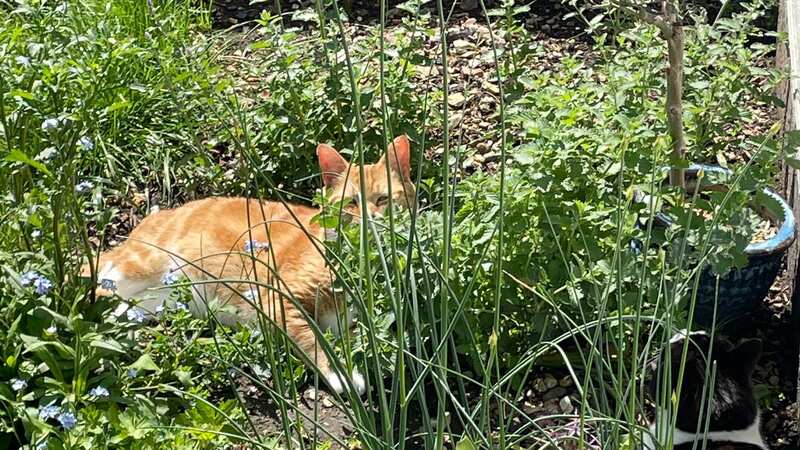Expert's simple tips to stop cats and foxes from using your garden as a toilet
Families often get frustrated when they find that a cat or fox has left its mess all over their garden. It can feel personal when an animal invades your lovely garden and leaves a nasty surprise.
Matt Jordan, a gardening expert for The Greenhouse People, shared his top tips with Express US on how to keep cats and foxes from messing in gardens. His advice is cheap, simple, and easy to follow.
He warned: "Much to the dismay of their owners, many pets will eat their own poo and other animal faeces. However, this is a very dangerous habit for your pet animal poo can host a variety of diseases and parasites. One of the deadliest for dogs is parvovirus which is highly contagious and often fatal in unvaccinated dogs."
He added: "Not only is poo dangerous to pets, but can also harm humans. Cat stool poses a very serious threat to both humans and other cats alike and should never be left to fester in the garden."
"Toxoplasmosis is an infection which infected cats can pass on to humans through their faeces and is particularly dangerous for those who are pregnant or have weakened immune systems. ."
 Furious chimp launches bottle at girl filming him leaving her bleeding at zoo
Furious chimp launches bottle at girl filming him leaving her bleeding at zoo
Keep it tidy
Cats and foxes like places to hide - so overgrown areas can make them feel secure and more likely to linger to do their business. Matt said: "Foxes love overgrown areas, so keeping your garden neat and tidy is a sure and effective way to help deter foxes from doing their business in your backyard."
"Focus on keeping your grass trimmed short, cutting back any overgrown bushes or shrubbery and keeping planting schemes tightly packed to avoid attracting foxes to den in your garden overnight and encouraging cats to come and dig in your garden."
But bear in mind that overgrown areas are also sanctuaries for lots of other wildlife, such as hedgehogs, while allowing wildflowers to grow will also help pollinators.
Make your own DIY repellent
Foxes have a very strong sense of smell and will eat almost anything. Gardens with chickens or rabbits, or bird food, accessible bins, and crops will be particularly appealing. Matt said: "Pests like foxes use scents to mark their territory to return to at a later date, which unfortunately for your garden means it'll become that fox's personal toilet."
"Spraying a vinegar mixture over your plants and lawn will help rid your garden of any marking scents and stop them from returning. You can also try adding scents foxes don't like, such as garlic or chilli peppers. To repel cats, try citrus smells or herbaceous fragrances such as lavender, rosemary and peppermint."
Invest in motion-sensor deterrents
As mentioned above, foxes and cats like to feel safe, so a motion sensor light or even sprinklers can be used to deter foxes. Matt explained: "Foxes and cats are more likely to move on from gardens where they don't feel secure, so sudden lights, noises and sensations should scare off unwanted guests and prevent your garden from becoming a public toilet."
"Motion-activated lights are not only a good investment for your home's safety, but they also conveniently keep foxes, cats and other pests at bay without bringing animals to harm."
 Scientists plan to ‘de-extinct’ the Dodo and release it back into the wild
Scientists plan to ‘de-extinct’ the Dodo and release it back into the wild
Remove food sources
To avoid cats and foxes looking for food Matt said: "You'll need to remove bird feeders and make sure your bins are secure. A sudden surge in cat and fox droppings could even be a sign that mice have found their way into your garden and are attracting predators. Double-check that your compost pile hasn't become a rodent nest and that there aren't any food scraps attracting vermin."
Introduce uncomfortable textures
This tip works for foxes but is mainly effective for deterring cats in particular, as they are "very sensitive to strange-feeling textures", so gardeners can easily deter them by being mindful of the type of materials being used in gardens, explained Matt.
He said: "For example, try spreading larger mulch chunks or rocks across flower beds to keep cats away. You can also lay some thin chicken wire over the surface of your soil for a safe way to make your garden uncomfortable to step on."
"Be wary that if you have stony areas in your garden, avoid using too fine a gravel which could be misinterpreted as a large litter tray for cats. You should avoid using any spikes or dangerous materials that could bring harm to your neighbouring felines and foxes."
* An AI tool was used to add an extra layer to the editing process for this story. You can report any errors to [email protected]
Read more similar news:
Comments:
comments powered by Disqus

































